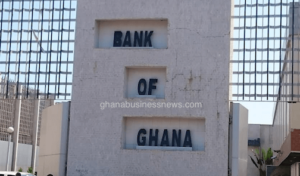Bank of Ghana revokes licences of 192 insolvent microfinance companies
 The Bank of Ghana has, with immediate effect, revoked the licences of 192 insolvent microfinance companies in the country.
The Bank of Ghana has, with immediate effect, revoked the licences of 192 insolvent microfinance companies in the country.
According to a press release copied to ghanabusinessnews.com, licences of another 155 insolvent microfinance companies that have ceased operations have also been revoked.
It explained that, “the revocation of the licences of these institutions is to get rid of insolvent and dormant institutions that have no reasonable prospects of rehabilitation and have denied depositors access to their deposits, thereby constituting a threat to the stability of the financial system. By the revocation of these licences, the Bank of Ghana seeks to protect the stability of the financial system and to protect affected depositors.”
The Bank took these actions in pursuant to section 123 (1) of the Banks and Specialized Deposit-Taking Institutions Act, 2016 (Act 930), which requires the Bank of Ghana to revoke the licence of a bank or Specialized Deposit-taking Institution (SDI) where the Bank of Ghana determines that the institution is insolvent or is likely to become insolvent within the next 60 days, the release noted.
According to officials at the Bank, efforts to get majority of the 484 distressed institutions functioning well since 2014 have not yielded any positive results.
The release indicated that severe undercapitalisation, high cost of operations largely from high and unsustainable interest rates offered to depositors, poor lending and investment practices leading to inordinate losses, diversion of customer deposits into private, unprofitable and speculative ventures, general noncompliance with prudential norms, poor corporate governance, weak internal controls, and fraud, among others led them into this state.
“Over the years, the Bank of Ghana notified these institutions of deficiencies and vulnerabilities which had been identified through off-site reviews and onsite examinations. Unfortunately, efforts by the Bank of Ghana to get the affected institutions and their shareholders and directors to rectify these deficiencies yielded no results.
“Consequently, the financial position of these institutions continued to deteriorate, leading to their insolvency with majority of them ceasing operations and closing their offices with depositors’ funds locked up. Even those that have not closed their offices are unable to pay their depositors”, it added.
The release says, the continuous operations of these microfinance companies has placed a substantial amount of depositors funds at risk.
A total number of 137 microfinance companies will continue to operate, it said.
However, all hope is not lost for customers yet, as the Bank says the government has made funds available to enable the Receiver pay depositors, after their claims are validated.
To ensure that the rest of the institutions are sanitized and consistently meet the requirements, The Bank of Ghana says, it has put some measures in place.
The measures it says, includes, “Undertaking a comprehensive review of licensing and supervisory policies and, directives; Reviewing the minimum capital requirements for microfinance companies and, encouraging possible consolidation through voluntary mergers and acquisitions; Introducing proportional corporate governance, fit and proper, and risk, management directives; Embarking on strict supervision of licensed institutions and enforcement of, relevant regulatory requirements; Increase the resources available for effective supervision of licensed, microfinance companies.”
The Bank has consequently appointed Mr. Eric Nipah as Receiver for the specified institutions in line with section 123 (2) of Act 930.
The Bank of Ghana assures the public of its continued commitment to protecting depositors’ funds and promoting the stability of the financial system.
By Asabea Akonor
